#pink capitalism
Text
May: apple vodka
June: GAY apple vodka
Stop making our lived experiences about your product marketing. There’s more you can do.
#pride month#pride month 2023#rainbow washing#rainbow capitalism#pink washing#pink capitalism#queer content#creator#content creator#lgbtqia#lgbt#lgbt India#india lgbt#pride#gay pride#lesbian pride#WLW pride#bisexual pride#trans pride#queer pride
968 notes
·
View notes
Text

#lgbtqia#lgbtq community#lgbt pride#lesbian#nonbinary#sapphic#lgbtq#queer#nonbinary lesbian#gay girls#pink capitalism#rainbow capitalism#disney#walt disney#pocahontas#moana#disney princess#cinderella#disney films#the little mermaid#corporate#corporate greed#innovation#companies#lesbian pride#wlw#sapphism
467 notes
·
View notes
Note
The latest standard pop article refers to Chat and Khem's relationship as a bromance at this rate by the end of this leg of the press tour they will be referred to as brothers 😂

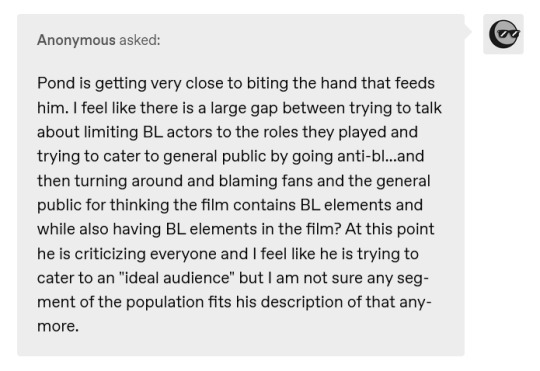
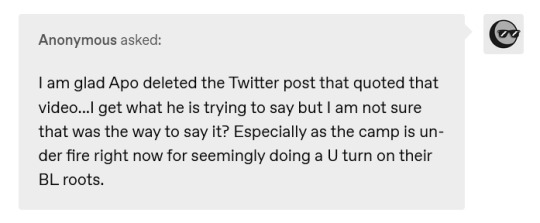
Hey, I'll coalesce these together then, if that's OK. For folks who want to, feel free to use this as a discussion post.
I've had a really long week, I've taken two different cats to the vet since Sunday so I'm not really in the mood to stir up more drama-- but... *makes grand gestures*
1.
I think the initial reaction to Pond's comment might have been overblown in the sense that it should have been something, given Pond's history of saying shit, that could be ignored. I'm perplexed by Man Suang comms account's decision to double down on this by posting the image with "Man Suang is not a bad movie; Man Suang is not a BL". Since most of the account's followers are already MileApo/Man Suang fans, I'm not sure what they were hoping to accomplish with that statement that could easily be taken the wrong way. Pond needs to say less. But I've also given up on analyzing the state of their PR/comms.
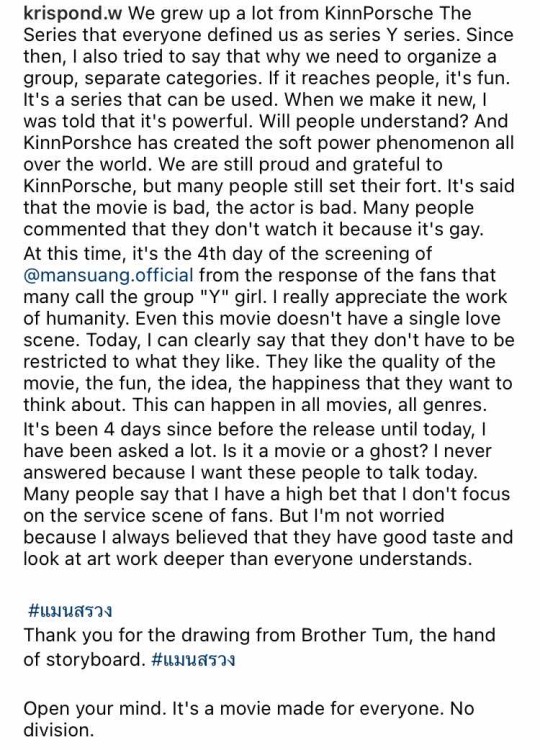

2.
It is somewhat telling to me that many people who are upset about Pond's comment and the account's statement and general straight washing of the movie are queer, though specific reactions range from actively angry on social media, quietly angry in closed fannish settings (chat, circle, servers, etc), attempt to placate other fans with empathy, or just apathetic towards the point of disengaging [read: me, due to other stress in my life]
Meanwhile, I haven't seen a single queer person go THEY NEVER PROMISED YOU A BL NEVER SAID THEY'D BE A COUPLE OR QUEER YOU'RE THE ONES WHO MADE THAT ASSUMPTION 🤪 So.
First to that--
Strawberry had shared this translation.

I realized, watching it back, this is what the autocaptioning(?)/Mint translator subbed it with:

I'm not sure if it's the lack of clarity in Thai that can be translated either way or the Mint team's translation is less specific while , but Apo also explicitly discussed that he played Khem as closeted, and it does a disservice to Apo's intentionality for the character to straight-wash the movie.
I think ultimately it depends on how one defines BL. From the classicist (ha!) perspective of the origination, BL has specific target demographic audience and definition.
Let's take these specific notes, with citations in the wikipedia entry itself:
Yaoi also known as boys' love and its abbreviation BL, is a genre of fictional media originating in Japan that features homoerotic relationships between male characters. It is typically created by women for women and is thus distinct from bara (gay manga), a genre of homoerotic media marketed to gay men.
"BL" is the common term used to describe male-male romance media marketed to women in Japan and much of Asia, though its usage in the West is inconsistent.
Given these specific definitions, I would actually agree without criticism that Pond is correct that Man Suang is not a BL in the same way it takes me out when people call CMBYN a BL because that is not its genre/target demographic. I would agree Man Suang is more arthouse film like CMBYN or Carol or Moonlight, or if we're going back farther, more popluarist like LOTR or Memoirs of a Geisha or Crouching Tiger. Of course these might be different genres, but idea of a popularist film is mean to be watched by everyone, not pushed to a specific demographic (vs. for example, Marvel which is marketed towards boys and young men, but is watched by the general public.)
Similarly, back to the origins of the BL genre, queer romances and queer main characters are not solely limited by the genre of BL. Even aside from Bara, there is Josei as a genre where notable works include Sakura Gari by Yu Watase (author of Fushigi Yugi and Ceres Celestial Legend) and The Carp on the Chopping Block Jumps Twice / The Cornered Mouse Dreams of Cheese. In Seinen, there is My Brother's Husband (the mangaka is a very famous Bara author). If you haven't heard of these, that's fine, but I'm serious about how much extensive understanding I have about the delineation about the nuances of what is "technically" BL and what isn't.
There is a disconnect in the audience's definition and what BOC is trying to communicate, and that's why friction is occurring.
That being SAID, AND VERY IMPORTANTLY, let's again recognize that the definition is about the target audience being young women, and the insistence and tone of which the marketing is pushing how it's NOT for the BL audience (young women) but to everyone is quite boldly misogynist for a company that built its foundation on female consumers. Its tone is overtly that something which is made for young women is somehow inherently "not good", the same way that romcoms are somehow less valuable as art, or boy bands or handsome young singers like Justin Bieber are less talented musicians because of its target audience.
So yes, I do have a problem with the tone they're taking and I think the biting the hand that feeds it comment is spot on.
3.
Finally, about Apo tweeting and deleting. I think he held and articulated himself well in interviews, and he's been insanely patient and tolerant these past few weeks (see: laris). I actually really relate to him in that sense because I can be calm and rational but sometimes I can't help but run my mouth. I held off on answering these because I've been so stressed and just couldn't handle whatever anger it might rile up.
Expecting someone to hold their temper 100% of the time is impossible even if they manage it 99% of the time. I've also tweeted angry things I've deleted in minutes later too. And I understand his perspective in not wanting to be limited to the genre or audience of the art he creates. So Apo's (valid and expected) reaction is understandable.
--
If it's okay, I'll probably not answer any more asks about this topic for probably a while. I have some other family stuff going on (not-cat family) and I just can't deal with people who don't have to be in my life causing this nonsense while I also have to deal with people (and cats) I can't get rid of attachments to also having stuff going on.
#man suang#kinnporsche#misogyny#pink capitalism#pond krisda#be on cloud#man suang promo#meta#bl meta
32 notes
·
View notes
Text

he’s like a wife to me
#art#artist#centricide#jreg#pinkcap#centricide pinkcap#pink capitalism#cutie patootie#my little meow meow#he’s just so
27 notes
·
View notes
Text

Joe Biden owes Pink Capitalism from Centricide $600
35 notes
·
View notes
Text
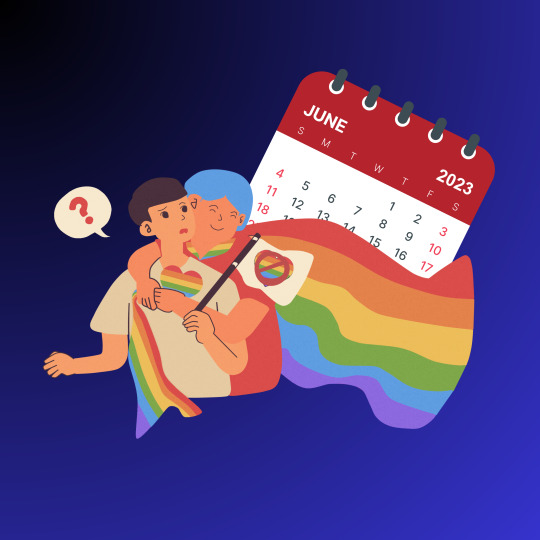
From Pride March to Pride Merch
By Ralph R. Sarza | Also published on Rappler
As we embark on the month of Pride, it is crucial to delve into the phenomenon known as pink capitalism, which lurks beneath the surface of this inclusive movement. “Pink capitalism” (also called “rainbow capitalism”) encompasses the commodification and commercialization of LGBTQ+ identities and struggles, raising profound implications that demand critical analysis.
Within the recognition of a significant market for LGBTQ+-specific products and services lies the genesis of pink capitalism. While the increasing visibility and acceptance of LGBTQ+ individuals in mainstream culture signify progress, the commodification of their experiences for capitalist gain raises valid concerns. Pride-themed merchandise and the commercialization of Pride events serve as prime examples of pink capitalism, necessitating a closer examination of corporate involvement and its impact on the community’s ongoing struggle for liberation.
Pride merchandise has emerged as a powerful manifestation of pink capitalism, encompassing a wide range of products adorned with rainbow colors and symbols of Pride. From clothing to accessories and flags, businesses ranging from local vendors to multinational corporations eagerly capitalize on the opportunity to showcase their support for LGBTQ+ rights. However, beneath this commercial enterprise lie questions about the authenticity and underlying motivations of corporate involvement in the LGBTQ+ movement.
A key concern surrounding pink capitalism is the concept of “rainbow washing,” where companies adopt Pride-themed merchandise and marketing campaigns as superficial and performative gestures. Such actions often lack a genuine commitment to addressing the systemic issues faced by the LGBTQ+ community or providing sustained support beyond the month of June. Critics argue that this exploitation for profit leads to shallow engagement that fails to bring about meaningful change or long-term impact.
The recent targeted attacks on Target Pride highlight the challenges faced by corporations aligning themselves with LGBTQ+ causes. These incidents not only expose the persistent existence of homophobia within society, but also underscore the risks associated with brands associating themselves with the LGBTQ+ community. The Target Pride controversy emphasizes the need for corporations to take a proactive approach in addressing homophobia and offering genuine support to the communities they claim to stand with.
While scrutinizing the motives and ethics of companies engaged in pink capitalism is crucial, individual consumers also play a pivotal role in promoting ethical consumerism. Making informed choices that align with personal values involves supporting LGBTQ+-owned businesses, prioritizing companies that demonstrate genuine and sustained support for the LGBTQ+ community, and holding corporations accountable beyond Pride Month. By actively engaging in ethical consumerism, individuals contribute to dismantling the exploitative tendencies of pink capitalism.
To transcend the limitations and criticisms of pink capitalism, a shift in focus is necessary — toward genuine and sustained support for LGBTQ+ communities. This shift involves centering community voices and needs, addressing systemic issues, fostering meaningful partnerships with LGBTQ+ organizations, and prioritizing long-term change over short-lived profit-driven gestures. By doing so, the LGBTQ+ movement can transcend the boundaries imposed by capitalism, cultivating an inclusive and authentic Pride movement.
As Pride Month unfolds, a moment of contemplation awaits us — a chance to reflect on the complexities of pink capitalism. Beyond the vibrant surface lies a phenomenon that requires our careful examination: the commodification and commercialization of LGBTQ+ identities and struggles, posing thought-provoking questions that deserve our attention.
Amidst these challenges, we must ask ourselves: can we transcend the limitations of pink capitalism and restore the authenticity that underpins the Pride movement? It is essential to critically analyze the notion of “rainbow washing” — superficial gestures by companies that lack genuine commitment. By redirecting our focus toward meaningful support, collaboration, and sustained advocacy, we can pave the way for lasting change. Let us rise above the exploitative tendencies of capitalism and foster an inclusive Pride movement that embodies authenticity and progress.
#Pride#Pride Month#Pride Month 2023#LGBT#LGBTQ#LGBTQIA#LGBTQIA+#Gay Pride#Gay Church#Open Table MCC#Tayo ang KULAYaan#pink capitalism#rainbow capitalism#rainbow washing#Pride 2023#Gay#Gays#Homosexuality#Homophobia
3 notes
·
View notes
Text
pink capitalism has been turned: on
2 notes
·
View notes
Text

the AUDACITY
#corporate bullshit#cringe#using pride month for their own benefit despite the fact they funded a movement in Uganda that made it legal to kill gay people#Fuck Chick-fil-A#pink capitalism
15 notes
·
View notes
Text
Pink/Rainbow capitalism.
I support the liberation of queer people from oppression, abuse, heteronormativity, etc. For far too long all over the world, hundreds of millions, perhaps billions of queer people have been shunned, forced into suppressing themselves, arrested, killed, and all other manner of horrible things. It's a good thing that today we are finally and shakily heading towards acceptance.
But in some ways I think this movement of emancipation is being co-opted by those seeking greater profit. New markets to exploit. New people to pander to. New cultures to appropriate in order to sell more goods and services.
I think it's unfair to say we are only being accepted because the capitalist need for new markets/infinite growth in a finite space. It took centuries of blood, sweat, and tears for any queer people to be accepted at all by Western society, let alone as equals. The organization efforts of those before us and those who continue to work should be applauded, commended, and studied so we can learn from them.
With that being said, it's increasingly apparent that corporations and other capitalist firms are trying to co-opt (and in my opinion undermine) the queer liberation movement to attract a "new market". It can be something as innocent and innocuous a rainbow on a Starbucks cup, or it could be something as horrible as offering tools for gender-affirming care for absolutely ludicrous prices. From ad campaigns and logo changes to socks from a company which makes machines which kill children and civilians.
If you want to wear pride buttons and fly flags, that it valid and fine. It's okay to have pride. But we must remember, these firms see us as nothing but numbers, commodities to be fulfilled. They don't care about us as individuals, no large organization does. They care about how much we can raise their bottom line.
Remember, a few decades ago, they were just as complicit in the oppression of queer people as any other government. If we want our liberation, it will never come from them. It will only come from us and our own solidarity.
4 notes
·
View notes
Text
There's the topic I see being brought up and that is "Queer baiting". That if Taylor doesn't come out she is doing just that. I'd like to take this for a moment and explain why I think this is wrong, but also why it is harmful.
First off, back when I watched the You Need To Calm Down music video, I felt that word queer baiting come to mind, what else could it be for a straight woman to be including herself (literally) within the crowd of LGBT?
The term queerbaiting refers to the practice of implying non-heterosexual relationships or attraction (in a TV show, for example) to engage or attract an LGBTQ audience or otherwise generate interest without ever actually depicting such relationships or sexual interactions.
- quote from dictionary site/a quick Google.
Queer baiting comes from putting enough subtext that implies the main characters of something fictional are queer and will end up together, without that ever happening. But most importantly, it's fiction.
Taylor isn't doing that. It's not queerbaiting to be in the closet and dropping whatever hints she can while still in her safety. It's not queerbaiting when it's an individual. We don't know what her situation is.
Now, do I think there is an issues with non LGBT artists/actors profiting off their gay audience or brands that do the same? Yes, and this is called Pink or Rainbow Capitalism. Purposely using queer people for their money.
So, is it possible the brand of Taylor Swift is profiting off the queer community and is that the conversation we should have?
Yes, however I am not sure how useful that would be and I haven't formed my opinion there. I would like to switch from saying she's queerbaiting to questioning if it's Pink capitalism.
Don't say a real life person is queerbaiting.
#queerbaiting#Gaylor#seems to be a topic atm#there are my two cents#pink capitalism#rainbow capitalism
3 notes
·
View notes
Text
kinda crazy that riot used the toothpaste gay flag when they already have a regular gay flag and yet has not had a single pride event with aro flags
#amatonormativity#aromantic erasure#pink capitalism#riot games#will forever be mad i cant crush my opponents in tft with a big Fuck Romance boom#or get the aro flag as a champ trail#like i am Pretty sure more people use the aro flag than the mlm flag especially since most mlm just use rainbow#is that not weird to anyone else??#especially because they literally added the ace flag so they Know what ace/aro identities are????
0 notes
Text
kweers being genuinely shocked that mass corporations don't actually care and sometimes campaign against them is HILARIOUS
heartbreaking when the company that profits from your gender doesn't even acknowledge you are human, almost as if businesses aren't your allies :( 💔
#me#trans#lgbt#pink money#pink capitalism#people still hate gays wake the fuck up if it was up to them child labour would still be legal#funny and annoying everytime it happens#also its always the kweers#straights/ 13 years olds that bc they arent fucking every day are asexual aromantic asthmatic etc/ men that paint their nails/ theater kids
1 note
·
View note
Text
Feels weird when I see the likes of Willow and Grease: Rise of the Pink Ladies referred to as Lost Media cause I always associate the term with shows like Doctor Who, whereby Lost Media is literal in that 'neither the fans nor the BBC knows where most of the missing episodes are, and The Feast of Steven probably doesn't exist any more and is unlikely to ever be watched again', rather than 'everybody knows exactly where the fuck they are, the multimillion dollar companies simply refuse to release them from hostage'.
498 notes
·
View notes
Text

private poster commission of the Great 8, Ovi!
#dude drawing the cup#SOOOO fun so shiny#10/10 would draw the stanley cup again let me put pink and lime green on it#hockey#hockey art#washington capitals#alexander ovechkin#poster#art#my art
124 notes
·
View notes
Text
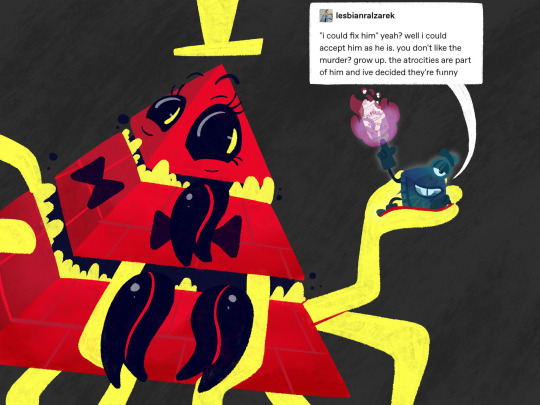
… hey, whatever helps you sleep at night, man
#bill cipher#Andrew Kryptos#gravity falls#love that my ipad capitalized his name but not bill’s. bill doesn’t deserve it#anyway cannot believe this is the first time I’ve drawn spider bill#also finally an excuse to draw Andy’s pink concept art flames… always thought those were cute
174 notes
·
View notes
Text

EEPY
#eepy eepy kitten....#she's all tucked in and curled up <3#LOOK AT HER!!! GAZE UPON HER PINK NOSE AND BEANS!#she's my little buddy <3#i wish i could get her leash trained i would Love to go on walks with her#she'd be unbearable! unmanageable!#absolutely unprompted#photos from the bog#alright now that thats out of the way guess what im fuming about today!#ha! you thought this was a cute kitten post! WRONG! eldritch blast!#yeah so fuck youtube all my homies hate youtube#WYM IT SENSES ADBLOCKER AND LITERALLY STOPS YOU FROM WATCHING VIDEOS#that should be illegal!#begging and praying that someone Talented at making site extensions makes one that gets around youtube's stupid fucking adblock sensor#I WOULD LIKE TO WATCH MY SILLY VIDEOS IN PEACE THANKS#this world sickens me. ads everywhere. everything monetized. sell your hobbies. what if we all exploded huh#WHERE IS THE FREEDOM FROM LATE-STAGE CAPITALISM? WHEN DOES THE MADNESS END#ads make me want to rip out someone's throat with my teeth#i dont mind the taste of blood let me commit violence
97 notes
·
View notes